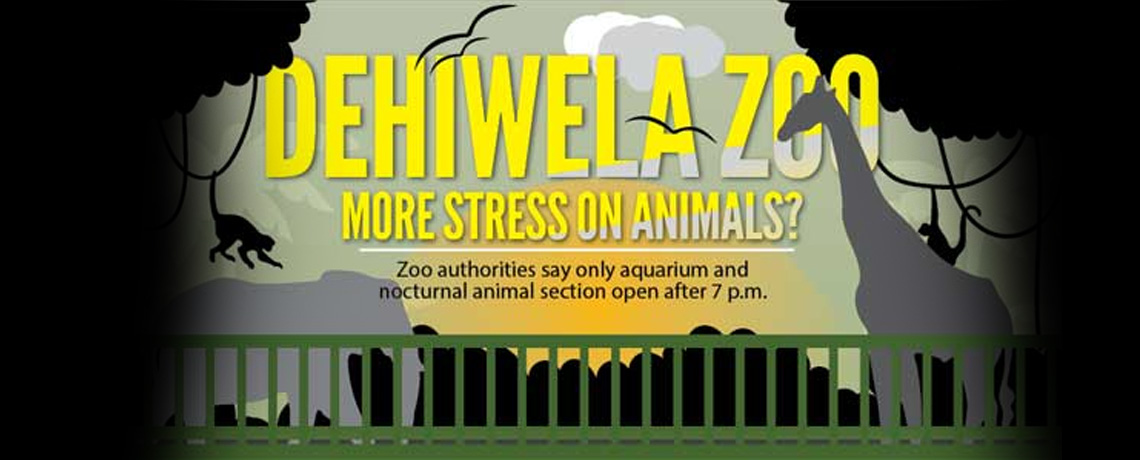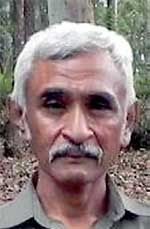Reply To:
Name - Reply Comment

Zoo authorities say only aquarium and nocturnal animal section open after 7 p.m.
In a bid to provide visitors to the National Zoological Gardens in Dehiwala more time a decision was taken to extend its visiting hours, Wildlife Minister Gamini Jayawickrama Perera recently said.
Accordingly, the zoo will be open to the public from 7.00 a.m. to 10.00 p.m. from September, while additional attractions will be established at the premises.
 While attending the 81 Anniversary of the National Zoological Gardens, Dehiwela recently the Minister revealed the details about the programme. He said a part of the zoo would be renovated under the new operation and the programme would be initiated in a manner that would not harass the animals.
While attending the 81 Anniversary of the National Zoological Gardens, Dehiwela recently the Minister revealed the details about the programme. He said a part of the zoo would be renovated under the new operation and the programme would be initiated in a manner that would not harass the animals.
He also said that under the initiative people would receive the opportunity to watch nocturnal animals and observe their behaviors. He also said the space would be renovated to look like the natural environment where the animals could roam freely.
The Daily Mirror spoke to Animal Rights activists and officials at the zoo regarding the decision.
Excerpts.
Director General (Ms.) Dammika Malsinghe, Department of National Zoological Gardens
 We have initiated a new programme to attract the tourists, who visit our country.
We have initiated a new programme to attract the tourists, who visit our country.
This programme came to light due to the lack of entertainment activities for tourists after dark. Through this concept we hope to generate an additional income to the Zoo.
We were affected by the recent floods but we are functioning as usual now.
According to the new plan the zoo will function under two separate schedules. The zoo will be open as usual from 8.30 a.m. to 6 p.m. and after a closure of one hour the Aquarium and nocturnal animal sections would be open for visitors from 7.00 p.m. to 10.00 p.m.
Under the programme separate paths have been selected for visitors to use and selected areas have been isolated and closed off from the areas occupied by some animals Ms. Malsinghe said.
She said the new timing would be a great opportunity for animal lovers, environmentalists and, zoologists to observe the night life of the animals.
Meanwhile, she assured the programme would be initiated in a manner that would not disturb other animals in other parts of the zoo and would ensure that their comfort would be the first priority.
“The programme was introduced by the Sustainable Development and Wildlife Minister Gamini Jayawickrama Perera and we believe it will be successful,” she said.
She said the value of such a move was identified a year ago and it was sure to bring in more tourists.
Otara Gunewardene, Animal Rights Activist
 It should never be just so that the visitors can have more time to see the animals, but is it right for the animals? Night time is when they rest and they suffer enough in these cramped and terrible caged conditions that they live in already. Their welfare should be priority, and then comes people and then profit.
It should never be just so that the visitors can have more time to see the animals, but is it right for the animals? Night time is when they rest and they suffer enough in these cramped and terrible caged conditions that they live in already. Their welfare should be priority, and then comes people and then profit.
Wild animals in captivity must be given a life as close to the one they have in the wild. Teaching our children and adults anything else is what has brought immense suffering to so many for our entertainment.
She also said the Minister and the committee should reveal more details on the plan to the public. She also said the animals could be distressed due to the new programme and that authorities should prevent such incidents.
Lalani Perera, Attorney and Animal Rights Activist
In this country, animal abuse for commercial gain is on the increase. Extending the visiting hours at the Dehiwala Zoo up to 10.00 p.m. is adding to this. It is reported that the reason is to give visitors more time to spend at the zoo. Is this an evidence based decision or a ruse to enhance the fast depleting State coffers?

While several countries are closing down their zoos for the sake of the welfare of the animals, this country appears to be adding to their sad plight.
As animal behaviourists observe zoo animals undergo severe stress, living away from their natural habitats, with visitors gawking, teasing and engaging in noisy revelry, thereby disturbing these animal during day time, seven days a week.
Close proximity to humans, exposure to noise and artificial lighting have been identified as some causes for this stress, which leads to stereotypical behavior, affecting their mental well being. This is in addition to the immense physical suffering the animals undergo due to confinement in captivity.
If zoos were to be continued with in this maner, they should take the form of sanctuaries, not commercial enterprises.
A group of us has through a case filed in the Court of Appeal, submitted comprehensive recommendations to the zoo authorities to enhance the welfare of zoo animals– one recommendation is that the Dehiwala zoo should be closed to visitors at least once a week and that no night visits should be allowed. But the progress of the recommendations has been woefully slow.
It is very sad that the Minister is also planning to add more attractions. We hope this does not include more performances by animals, especially elephants, to entertain visitors, as the training methods for performances are extremely cruel.
Jagath Gunawardana, Lawyer, Environmentalist
 I have seen the proposal and I don’t think it’s a bad move if it is adopted according to the approved standards. These nocturnal animals should have a special enclosure with night lighting. It is also important to not allow the visitors to take photographs with flashlights. The visitors should also be prevented from making loud noises which would trouble the animals.
I have seen the proposal and I don’t think it’s a bad move if it is adopted according to the approved standards. These nocturnal animals should have a special enclosure with night lighting. It is also important to not allow the visitors to take photographs with flashlights. The visitors should also be prevented from making loud noises which would trouble the animals.
If the correct protocols are followed I’m sure the animals will act normal regardless of the people’s presence. Though these kind of programme are new to Sri Lanka the world has already adopted it in their Zoological Gardens. Therefore I do not think we should cause any unnecessary panic about it.
The Daily Mirror also found an introduction to the National Zoological Gardens. It is as follows:
The National Zoological Gardens, Dehiwela – more commonly called Colombo Zoo – has a long history. In the early years of the 20th century, John Hagenbeck, brother of the famous animal trainer, Carl Hagenbeck had established the Ceylon Zoological Gardens as a company at Dehiwala.
Initially the Zoo came under the purview of the Government Agent of Colombo and was headed by a Superintendent. When it was made an autonomous department in 1946, the main aim was to satisfy people’s curiosity and thus the Zoo was more focused on entertainment rather than conservation.
Type of exhibits and many other associated features have taken into account for animal enclosures with the changes of new zoo concept the existing techniques. Numbers of species in exhibits were scaled down and many animals were given significant spaces in order to facilitate their natural behaviour.